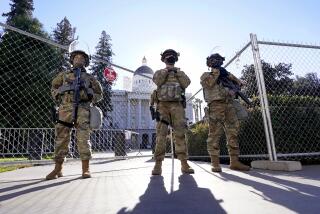England Gives Up Right to Hearing
- Share via
FT. HOOD, Texas — Army Pfc. Lynndie England on Tuesday surrendered her right to challenge the seven charges she faces in the Abu Ghraib prison abuse scandal, moving her closer to a new military trial.
Her defense attorney, Capt. Jonathan Crisp, would not explain why he decided not to go forward with the Article 32 hearing -- the military equivalent of a grand jury proceeding -- except to say it was part of an “evolving trial strategy.”
Now Lt. Gen. Thomas Metz, Ft. Hood’s commanding general, will decide whether England will face any or all of the charges.
Crisp said the hearing waiver was not part of a deal with prosecutors. He said he did not expect another plea agreement after England’s initial guilty plea was rejected by a judge this month.
Prosecution spokeswoman Maj. Rose Bleam said that if Metz ordered a trial, it could start by next month.
England is charged with two counts of conspiracy to maltreat detainees, four counts of maltreatment and one count of committing an indecent act. She could get up to 11 years in prison. Some acts were photographed. In one picture, the 22-year-old reservist held a leash looped around the neck of a hooded, naked prisoner. Another showed her next to naked prisoners stacked in a pyramid, and a third depicted England pointing at a prisoner’s genitals, a cigarette dangling from her lips.
Earlier, Crisp had described his client as emotionally drained by her long legal fight, particularly after her guilty plea was abruptly thrown out May 4.
“She’s still in the same position she was before [the deal], and she wants to move on with the next stage of her life,” Crisp said.
A military judge threw out England’s guilty plea when testimony during sentencing contradicted her claim that the photos were taken solely to amuse the U.S. guards. Pvt. Charles A. Graner Jr., serving 10 years for his mistreatment of Iraqi detainees, testified that the pictures were to be used as training aids for other guards.
Under military law, the judge could accept the guilty plea only if he were convinced that she knew at the time that her actions were illegal.
Graner had been named as a possible defense witness at the Article 32 hearing, which had been scheduled to start Tuesday.
England’s case is the last to be resolved among those of low-ranking soldiers charged with abuses of Iraqis at the Abu Ghraib prison outside Baghdad, where U.S. forces kept thousands of prisoners at the time of the October and November 2003 incidents.
Six soldiers pleaded guilty and two were found guilty at trial. No high-ranking officers have been sanctioned for criminal abuse of prisoners.
More to Read
Sign up for Essential California
The most important California stories and recommendations in your inbox every morning.
You may occasionally receive promotional content from the Los Angeles Times.









